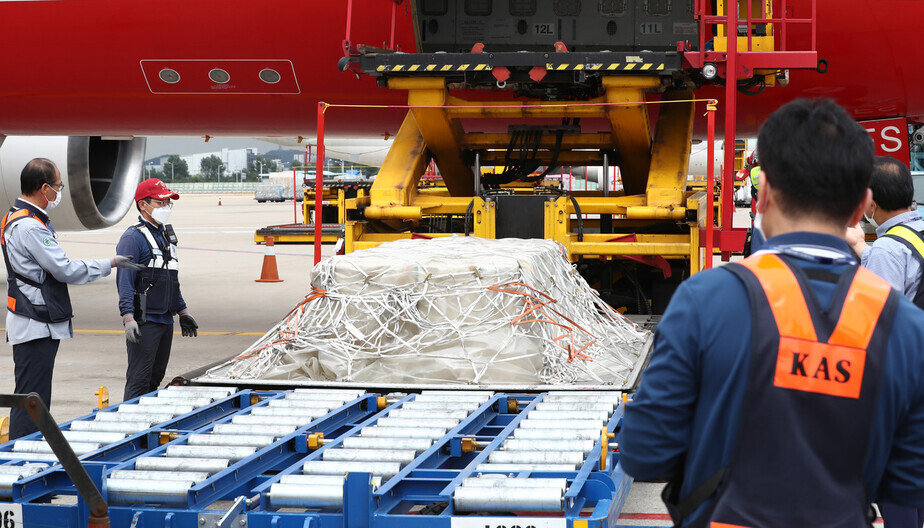hankyoreh
Links to other country sites 다른 나라 사이트 링크
COVID-19 vaccine, leukemia have no causal links, S. Korean government says

Domestic scholars say no evidence shows a link between vaccination against COVID-19 and acute myeloid leukemia.
With a national petition filed that warns of the rise of the disease after vaccination, the government held consultations with experts. With women complaining of irregular bleeding after getting their shots per the petition, authorities will boost monitoring of abnormal reactions.
The government's vaccination task force on Thursday said, "Consultations with the Korean Society of Hematology (KSH) concluded that no evidence shows that [vaccines] cause or trigger leukemia." The organization added that the notion of leukemia occurring shortly after inoculation is inconsistent with medical theories, with no data to date supporting a causality between vaccines, including those against COVID-19 and the flu and leukemia.
The government's consultations with the KSH were held after petitions filed on the presidential office's National Petition of Korea bulletin board claimed that people got leukemia after getting vaccinated.
Kim Jin-seok, a KSH director and a professor of hematology at Yonsei University, said, "Factors linked to acute myeloid leukemia include select genetic predispositions, carcinogens such as benzene and toxic substances like anticancer drugs, but the cause [of the disease] is mostly unknown."
"Among them, anticancer drugs, which are well known as a cause and for their occurrence period, can take years to cause the disease after exposure," he added. "Based on theories of what causes acute myeloid leukemia, the notion that the disease can occur days to months after getting a COVID-19 vaccine is theoretically incorrect."
Cho Eun-hee, head of the task force's vaccination safety management team, said in a briefing the same day, "Fears over getting leukemia after vaccination against COVID-19 are unfounded, so please get your shots based on your individual health condition."
The task force also said there is no clear connection between vaccination and women's menstrual disorders, including irregular bleeding after inoculation, but urged medical attention if such bleeding persists.
"Stress, fatigue, thyroid disease, uterine myoma and reactions to drugs are all potential triggers. In the event of unexpected vaginal bleeding after vaccination or massive and prolonged hemorrhaging, get treatment at a medical facility," Cho said.
As of Thursday, 18 cases of menstrual disorders were reported nationwide allegedly as abnormal reactions to COVID-19 vaccines. The UK, as of Aug. 18, had 32,455 reported cases of vaginal bleeding or menstrual disorders after vaccination.
The task force said it will thoroughly review foreign reports on abnormal menstrual trends and boost its close monitoring of the domestic situation.
Earlier, a petition posted on the presidential office's petition bulletin board reported irregular bleeding as a side effect of vaccines.
By Seo Hye-mi, staff reporter
Please direct comments or questions to [english@hani.co.kr]

Editorial・opinion
![[Column] Season 2 of special prosecutor probe may be coming to Korea soon [Column] Season 2 of special prosecutor probe may be coming to Korea soon](https://flexible.img.hani.co.kr/flexible/normal/500/300/imgdb/original/2024/0426/3317141030699447.jpg) [Column] Season 2 of special prosecutor probe may be coming to Korea soon
[Column] Season 2 of special prosecutor probe may be coming to Korea soon![[Column] Park Geun-hye déjà vu in Yoon Suk-yeol [Column] Park Geun-hye déjà vu in Yoon Suk-yeol](https://flexible.img.hani.co.kr/flexible/normal/500/300/imgdb/original/2024/0424/651713945113788.jpg) [Column] Park Geun-hye déjà vu in Yoon Suk-yeol
[Column] Park Geun-hye déjà vu in Yoon Suk-yeol- [Editorial] New weight of N. Korea’s nuclear threats makes dialogue all the more urgent
- [Guest essay] The real reason Korea’s new right wants to dub Rhee a founding father
- [Column] ‘Choson’: Is it time we start referring to N. Korea in its own terms?
- [Editorial] Japan’s rewriting of history with Korea has gone too far
- [Column] The president’s questionable capacity for dialogue
- [Column] Are chaebol firms just pizza pies for families to divvy up as they please?
- [Column] Has Korea, too, crossed the Rubicon on China?
- [Correspondent’s column] In Japan’s alliance with US, echoes of its past alliances with UK
Most viewed articles
- 1AI is catching up with humans at a ‘shocking’ rate
- 2‘We must say no’: Seoul defense chief on Korean, USFK involvement in hypothetical Taiwan crisis
- 3[Column] Season 2 of special prosecutor probe may be coming to Korea soon
- 4Division commander ordered troops to enter raging flood waters before Marine died, survivor says
- 5Is Japan about to snatch control of Line messenger from Korea’s Naver?
- 6Korea protests Japanese PM’s offering at war-linked Yasukuni Shrine
- 7Is N. Korea threatening to test nukes in response to possible new US-led sanctions body?
- 8One Hyundai worker suffers through 16 piecemeal contracts in 23 months
- 9[Photo] Migrant workers rally for labor rights
- 10Korea once again ranks near bottom of list for gender parity, report shows